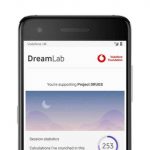 One of the more significant areas of promise in health technology is the ability for data to be generated by us as individuals, and for AI to provide insights based upon this live stream of lifestyle data. An example of what’s possible comes via a project researchers at Imperial College London have undertaken with the Vodafone Foundation.
One of the more significant areas of promise in health technology is the ability for data to be generated by us as individuals, and for AI to provide insights based upon this live stream of lifestyle data. An example of what’s possible comes via a project researchers at Imperial College London have undertaken with the Vodafone Foundation.
The project aims to tap into the power of users smartphones to crunch cancer related data whilst they sleep. Such distributed computing projects have been popular for some time, but this is one of the first to utilize the power in our smartphones.
The rationale for the project is identical to that of the early distributed computing ventures, such as SETI@Home, which utilized spare computing resources to process data from space. The average smartphone contains a huge amount of computing power that generally lies dormant over night.
Dream Lab
Users participate by downloading the DreamLab app onto their phone and run it for six hours overnight as the phone charges. The sleep downloads a small packet of data overnight, with the processors in the phone then running millions of calculations, uploading the results to a central server, and clearing the data from the phone.
The app has already been used in Australia, with researchers using it to crunch data for pancreatic cancer, and is now ready to be used for the first time in Europe. If they can secure 100,000 users running the app each night, the team can process as much data as a single desktop computer could process in 100 years.
“Through harnessing distributed computing power, DreamLab is helping to make personalised medicine a reality,” the researchers say. “This project demonstrates how Imperial’s innovative research partnerships with corporate partners and members of the public are working together to tackle some of the biggest problems we face today, generating real societal impact.”
The team hope that this kind of data-led approach could help them to identify combinations of drugs based upon the genotype of the cancer itself. There is currently huge amounts of health data generated every day, but tiny fractions of it are being put to use. By tapping into the dormant processing power of the global smartphone population, the team hope to rectify that.
“Every cancer patient in the UK could have DNA tested within the next decade. The challenge is how to use patients own data for more personalized therapy selection,” they say. “In this exciting collaborative project with Vodafone, we have implemented and deployed the machine-learning algorithms on mobile phones to simulate the effect of cancer mutations and drugs on intracellular molecular circuits”